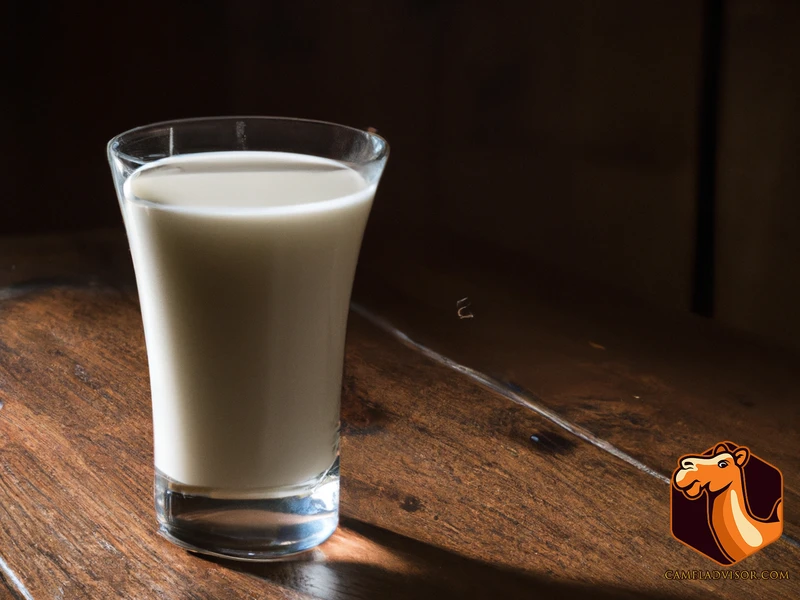As we search for healthier food alternatives, have you ever considered trying camel milk? While this might seem unusual to some, camel milk has been consumed for hundreds of years in certain parts of the world. In fact, it’s considered a staple in many Middle Eastern and African countries. Perhaps you’re asking yourself, what makes camel milk so special? Well, let’s explore the nutritional value and health benefits of this unique drink in this comprehensive guide.
Contents
- Nutritional Value of Camel Milk
- Health Benefits of Camel Milk
- How to Consume Camel Milk
- Possible Side Effects and Precautions
- Where to Buy Camel Milk
- Conclusion
-
Frequently Asked Questions
- Why should I consider drinking camel milk?
- Is camel milk safe to consume regularly?
- Can camel milk help me manage diabetes?
- Can camel milk cause allergies?
- Can I use camel milk as a skincare product?
- Can pregnant women drink camel milk?
- How does the nutritional value of camel milk compare to other types of milk?
- Can camel milk be used in cooking and baking?
- What is the difference between fresh and powdered camel milk?
- Is camel milk more expensive than other types of milk?
- References
Nutritional Value of Camel Milk

Camel milk has been an important source of nutrition for many cultures for centuries. As a staple in the Middle Eastern and North African diet, this milk is now gaining popularity in other parts of the world due to its exceptional nutritional value. Rich in protein, healthier fats, vitamins, and minerals, camel milk is a powerhouse of nutrients. Besides being used for its nutritional benefits, camels are also used for transportation, sport, fashion, and even their manure is utilized as a source of fuel and fertilizer. Let’s dive deeper into the nutritional value of camel milk and its benefits for human health.
Protein and Fats
Camel milk is an excellent source of protein and healthy fats. With a high protein content of up to 3.6%, camel milk is known to contain all the essential amino acids required by the body. This makes it a complete protein source for individuals who may be on vegetarian or vegan diets. Additionally, the fat content in camel milk is comparatively lower than cow’s milk, with a range of about 2.2% to 2.9%. Unlike cow’s milk, which has a high content of saturated fats, camel milk contains unsaturated fats, such as Oleic Acid and Linoleic Acid that offer several health benefits.
Camel milk proteins break down more easily than cow’s milk proteins, which makes them easier to digest. People who are lactose intolerant or allergic to cow’s milk can often safely consume camel milk without any adverse effects. The relatively low-fat content of camel milk means it does not cause a significant increase in cholesterol levels in the body, contributing to the reduced risk of heart diseases.
Camel milk is also a great source of a variety of critical minerals such as calcium and magnesium. Calcium is widely known for keeping bones healthy and strong, while magnesium supports various body functions, including converting food into energy, nerve and muscle function, and regulating blood sugar levels. Additionally, camel milk contains high levels of Vitamin D, which helps the body absorb calcium and also supports immune function.
The protein and fat content make camel milk a highly nutritious option with several benefits for human health. For more information about camels and their uses, check out our article on domesticated camels.
Minerals and Vitamins
Camel milk is a rich source of various minerals and vitamins that are important for human health. It contains high levels of calcium, phosphorus, and zinc, as well as vitamins A, B1, B2, B12, and C.
Calcium: Camel milk is an excellent source of calcium, which is essential for strong bones and teeth. Calcium also plays a role in muscle function and nerve transmission.
Phosphorus: Phosphorus is another important mineral found in camel milk. It works together with calcium to support strong bones and teeth. Phosphorus also plays a role in energy production and cell function.
Zinc: Camel milk is a good source of zinc, which is important for a healthy immune system. Zinc also supports wound healing and helps maintain healthy vision and skin.
Vitamin A: Vitamin A is important for maintaining healthy eyesight, skin, and immune function. Camel milk is a rich source of this vitamin, which is especially important for individuals who live in areas where vitamin A deficiency is common.
Vitamin B1: Vitamin B1, also known as thiamin, is important for energy production and proper nervous system function. It also plays a role in muscle and heart function.
Vitamin B2: Vitamin B2, also known as riboflavin, is important for energy production and cell function. It also helps maintain healthy skin and eyes.
Vitamin B12: Vitamin B12 is important for maintaining healthy nerve cells and red blood cells. It also plays a role in DNA production and energy metabolism.
Vitamin C: Camel milk is a good source of vitamin C, which is important for a healthy immune system. It also plays a role in collagen production, which is essential for healthy skin and connective tissue.
Incorporating camel milk into your diet can provide you with a wide range of essential vitamins and minerals that are important for overall health and wellbeing. Additionally, camel milk has been used for various purposes in different cultures including racing, fashion, transportation, and even ceremonies. You can learn more about these interesting uses by clicking on the link.
Health Benefits of Camel Milk
If you’re looking for a unique and nutritious alternative to cow’s milk, camel milk may be just what you need. This milk has been a staple in many cultures for centuries, and it is becoming increasingly popular around the world. Camel milk is packed with nutrients and has several potential health benefits. It has been used for medicinal purposes in various cultures for centuries. For example, camel milk was traditionally used in the Middle East to treat malnourishment and to boost energy levels. These days, it’s used for everything from boosting the immune system to promoting heart health. If you’re curious about this unusual beverage, keep reading to find out more about the various health benefits of camel milk, and how you can incorporate it into your diet. Also, if you’re interested in the fascinating cultural significance of camels, check out our articles on history of camel transportation, camel ceremonies, camel racing, camel polo, and camels in eco-tourism. However, before incorporating camel milk into your diet, be aware of possible side effects and precautions, which we discuss later in this article.
Boosts Immune System
Camel milk is known for its various health benefits, one of which is boosting the immune system. It contains essential nutrients that help improve the body’s defense mechanisms against infections and diseases. Let’s take a closer look at the specific nutrients that contribute to this benefit in the following table:
| Nutrient | Function | Sources |
|---|---|---|
| Immunoglobulins (Igs) | Antibodies that bind and neutralize harmful pathogens | Present in camel milk |
| Lactoferrin | Antimicrobial and anti-inflammatory properties; enhances immune response | Present in camel milk |
| Vitamin C | Powerful antioxidant; improves immune function | Present in camel milk in small amounts |
| Zinc | Essential mineral for immune function and wound healing | Present in higher amounts in camel milk compared to cow’s milk |
The combination of these nutrients in camel milk may provide a nutritional boost to the immune system. Additionally, camel milk has been shown to contain higher levels of certain proteins, such as lactoferrin, that have antimicrobial and anti-inflammatory properties. These properties make camel milk an effective natural remedy for certain infections that cause inflammation in the body.
It’s important to note that while camel milk may help support the immune system, it cannot be used as a substitute for medical treatment of illnesses or infections. It should be considered as a helpful addition to any treatment plan.
With all these benefits, it’s no wonder that camel milk has been widely used in traditional medicine for centuries. Even camel manure has been considered useful as fuel and fertilizer. However, it is always important to consume camel milk in moderation and according to your doctor’s recommendations, especially if you have specific health conditions.
Aids Digestion
Camel milk can aid digestion in several ways. First, it contains a high level of proteins, which are easily broken down and absorbed by the body. These proteins help to build and repair tissues, including those in the digestive tract. Additionally, camel milk contains a unique protein called immunoglobulin, which helps to fight off harmful bacteria and viruses that can cause digestive problems.
Camel milk contains beneficial bacteria known as probiotics, which are essential for maintaining a healthy gut. These probiotics promote the growth of good bacteria in the gut, helping to maintain a healthy balance in the digestive system.
Camel milk has also been shown to reduce the symptoms of certain digestive disorders, such as irritable bowel syndrome (IBS) and Crohn’s disease. The high levels of vitamins and minerals in camel milk can help soothe inflammation in the gut and reduce flare-ups of these conditions.
It is important to note that while camel milk can aid digestion, it should not be used as a replacement for medical treatment for digestive disorders. Consult with a healthcare professional before incorporating camel milk into your diet for digestive health benefits.
Lastly, it should be mentioned that camels themselves are heavy consumers of fibrous plants, so their milk is rich in prebiotic fibers that can help maintain healthy gut bacteria. These beneficial fibers, along with the probiotics in camel milk, can work together to promote healthy digestion.
Using camel milk as a part of a balanced and healthy diet can provide many benefits for digestive health. However, it is important to consume it in moderation and as a part of a varied diet.
Reduces Inflammation and Allergies
Camel milk has been found to have anti-inflammatory properties, which can help reduce inflammation throughout the body. This can be especially beneficial for individuals who suffer from inflammatory conditions such as arthritis or irritable bowel syndrome (IBS).
According to a study published in the Journal of Food Science and Technology, camel milk contains bioactive peptides that have anti-inflammatory effects. These peptides work by inhibiting the production of pro-inflammatory cytokines, which are molecules that promote inflammation in the body.
In addition to reducing inflammation, camel milk may also be beneficial for individuals who suffer from allergies. A study published in the Journal of Dairy Science found that consuming camel milk can help alleviate symptoms associated with food allergies. In the study, participants who were allergic to cow’s milk were given camel milk for two weeks. By the end of the study, the participants showed a significant reduction in symptoms such as itching, rash, and diarrhea.
Table:
| Condition | Benefit of Camel Milk |
|---|---|
| Inflammatory conditions (e.g. arthritis, IBS) | Contains bioactive peptides that inhibit the production of pro-inflammatory cytokines |
| Allergies | Can alleviate symptoms associated with food allergies |
It is important to note that more research is needed in order to fully understand the anti-inflammatory and anti-allergenic properties of camel milk. While these preliminary studies show promising results, it is important to speak with a healthcare provider before using camel milk as a treatment for any medical condition.
One unique aspect of camel milk is that it contains immunoglobulins, which are also present in human breast milk. Immunoglobulins are antibodies that help to strengthen the immune system and fight off infections. This may contribute to the anti-inflammatory and anti-allergenic effects of camel milk.
Anchor: For individuals who suffer from allergies, consuming camel milk may offer relief from symptoms.
Promotes Heart Health
One of the notable benefits of camel milk is its ability to promote heart health. This is due to its low levels of cholesterol and high levels of nutrients that are good for the heart. Here are some of the ways camel milk can promote heart health:
- Reduces the risk of heart disease: Camel milk contains healthy unsaturated fats that can reduce the risk of heart disease by lowering cholesterol levels in the blood.
- Regulates blood pressure: One study showed that consuming camel milk for 4 weeks helped regulate blood pressure in people with hypertension.
- Improves blood circulation: The high iron content in camel milk can help improve blood circulation, which is important for heart health.
- Rich in antioxidants: Camel milk contains antioxidants such as vitamins C and E, which can help protect the heart by reducing oxidative stress and inflammation.
It’s important to note that while camel milk can promote heart health, it should not be relied on as the sole solution for heart problems. A healthy diet and lifestyle are still important for overall heart health.
If you’re interested in using other camel products for sustainable living, you may want to check out our article on camel manure as fuel and fertilizer.
Helps Manage Diabetes
One of the most promising health benefits of camel milk is its ability to help manage diabetes. Studies have shown that consuming camel milk can have a positive effect on blood sugar levels, making it a potentially useful addition to the diets of those who suffer from diabetes.
Here are some ways in which camel milk can help manage diabetes:
- Lower insulin resistance: Insulin resistance occurs when the body becomes less responsive to insulin, which can lead to high blood sugar levels. Camel milk has been found to contain compounds that can lower insulin resistance and improve overall insulin sensitivity.
- Regulate blood sugar levels: Camel milk contains natural insulin-like proteins that can help regulate blood sugar levels. This can prevent the spikes and drops in blood sugar that are common in diabetics.
- Reduce inflammation: Inflammation is a common complication of diabetes. Camel milk contains anti-inflammatory compounds that can help reduce the inflammation associated with the disease.
- Improve pancreatic function: The pancreas is responsible for producing insulin, and damage to the pancreas is a common complication of diabetes. Camel milk has been found to contain compounds that can stimulate pancreatic function and improve overall pancreatic health.
While these benefits are promising, it’s important to note that consuming camel milk should not replace medication or other diabetes management strategies. It’s also important to speak with a healthcare professional before adding camel milk to your diet.
Combats Autoimmune Diseases
Camel milk has been found to have potential benefits in combating autoimmune diseases. Autoimmune diseases occur when the immune system mistakenly attacks healthy cells in the body. This can lead to the development of chronic conditions that can impact different parts of the body.
Here are some ways in which camel milk can help:
- Reduces Inflammation: Camel milk has been found to have anti-inflammatory properties, which can potentially help reduce inflammation associated with autoimmune diseases. Chronic inflammation can damage tissues and organs, and reducing it can lead to a healthier body overall.
- Boosts Immune System: Camel milk contains high levels of immunoglobulins, which are antibodies that help protect the body against harmful invaders. This can potentially help strengthen the immune system in people with autoimmune diseases.
- Regulates Immune Response: The proteins present in camel milk have been found to regulate the immune response, which can help prevent the immune system from attacking healthy cells. Additionally, camel milk has been found to have a balancing effect on the immune system, potentially reducing the risk of autoimmune disease development.
- Improves Gut Health: Studies have shown that camel milk can improve gut health, which can be beneficial for those with autoimmune diseases. The gut and immune system are closely linked, and a healthy gut can help regulate the immune response, potentially reducing the risk of autoimmune diseases.
While the research on camel milk’s potential benefits for autoimmune diseases is still in its early stages, initial findings suggest that it could be a beneficial addition to the treatment regimen for people with autoimmune diseases. However, it is important to consult with a healthcare professional before incorporating camel milk into your diet, especially if you have a diagnosed autoimmune disease.
Supports Skin and Hair Health
Camel milk has a high content of essential fatty acids, such as linoleic acid and alpha-linolenic acid, which are necessary for maintaining healthy skin and hair. These fatty acids help to keep the skin and hair hydrated and nourished.
1. Anti-Aging Benefits
Camel milk contains antioxidants, such as Vitamin C and Vitamin E, which help to protect the skin from oxidative stress and free radicals. This can help to reduce the signs of aging, such as fine lines and wrinkles.
2. Moisturizes Skin
Camel milk’s high fat content helps to moisturize the skin and prevent dryness. It also contains lactose, which has been shown to improve skin hydration.
3. Treats Skin Conditions
Camel milk has antibacterial, antifungal, and antiviral properties, which can help to treat skin infections and conditions like acne, eczema, psoriasis, and rosacea.
4. Helps Prevent Hair Loss
The essential fatty acids found in camel milk can help to nourish and strengthen hair, preventing hair breakage and hair loss.
5. Promotes Healthy Hair Growth
In addition to preventing hair loss, camel milk can also help to promote healthy hair growth due to its high protein content. The protein in camel milk helps to strengthen hair follicles and encourage new hair growth.
Incorporating camel milk into your diet may have numerous benefits for your skin and hair health.
May Help with Autism
Research has suggested that camel milk may be helpful in managing certain symptoms associated with autism. Autism is a complex developmental disorder that affects communication, behavior, and social interaction.
One study conducted in 2017 found that children with autism who consumed camel milk showed improvements in social communication, eye contact, and behavior compared to those who did not consume camel milk. The study also suggested that camel milk may have a positive effect on reducing oxidative stress in the brain, which is related to autism.
Another study published in 2020 reported that camel milk supplementation improved cognitive function and reduced anxiety symptoms in children with autism.
While more research is needed in this area, these studies suggest that incorporating camel milk into the diet may be worth considering for children with autism. It is important to consult with a healthcare professional before making any dietary changes.
Here is a table outlining some of the potential benefits of camel milk for children with autism:
| Potential Benefits of Camel Milk for Children with Autism |
|---|
| Improved social communication |
| Increased eye contact |
| Reduced behavior problems |
| Improved cognitive function |
| Reduced anxiety |
How to Consume Camel Milk

Camel milk consumption may be a new experience for many people. However, with its numerous health benefits, it is worth exploring. But how should one consume camel milk? In this section, we will discuss various ways to consume camel milk and the advantages and disadvantages of each method. Whether you prefer fresh milk or powdered milk, there is a way to incorporate this unique and nutritious beverage into your daily routine. Let’s take a closer look.
Fresh Milk vs Powdered Milk
When it comes to consuming camel milk, there are two main options – fresh milk or powdered milk. Both of these have their own advantages and disadvantages based on different factors.
Fresh Camel Milk is the unpasteurized, raw milk that is obtained straight from the camel. It has a slightly sweet and salty taste, and is consumed in many countries where camels are found. Fresh camel milk is often preferred over cow’s milk due to its nutritional benefits and unique taste. However, it has a shorter shelf life and needs to be refrigerated if not consumed immediately.
Powdered Camel Milk is made by evaporating the water content from fresh camel milk and turning it into a powder form. The powder can then be stored for a longer period without refrigeration. One of the main advantages of powdered camel milk is its convenience – it can be easily carried while traveling and prepared quickly by adding water. On the other hand, the process of creating powdered milk may impact some of the nutrients present in the fresh milk.
The following table highlights the main differences between fresh and powdered camel milk:
| Criteria | Fresh Camel Milk | Powdered Camel Milk |
|---|---|---|
| Nutritional Value | Contains more nutrients and bioactive compounds | May lose some nutrients during processing |
| Shelf life | Shorter shelf life; needs refrigeration if not consumed immediately | Longer shelf life; can be stored without refrigeration |
| Taste | Has a unique sweet and salty taste | Has a similar taste to cow’s milk |
| Convenience | Needs to be collected fresh and requires refrigeration | Easy to carry and prepare, does not need refrigeration |
Choosing between fresh camel milk and powdered camel milk depends on personal preferences and circumstances. If one has easy access to fresh camel milk and enjoys its taste, it may be the preferred choice. However, for individuals who are constantly on the move, powdered camel milk may be a more convenient option. It is important to note that powdered milk may not have all of the nutritional benefits of fresh milk, so one may need to find ways to incorporate fresh camel milk into their diet when possible.
Recipes Using Camel Milk
When it comes to incorporating camel milk into one’s diet, there are many recipes that can be made with this unique ingredient. Here are some ideas for dishes that feature camel milk:
- Camel Milk Chai Tea: Combine black tea, camel milk, and a blend of spices such as cinnamon, cardamom, and ginger for a warm and comforting drink.
- Camel Milk Smoothie: Blend fresh or powdered camel milk with your favorite fruits, such as berries or bananas, for a healthy and tasty beverage.
- Camel Milk Rice Pudding: Cook rice in camel milk and sweeten with honey, then add in raisins, nuts, and spices such as nutmeg and cinnamon for a delicious dessert.
- Camel Milk Ice Cream: Combine fresh camel milk, sweetener, and your favorite flavors, such as vanilla, chocolate, or fruits, then churn in an ice cream maker for a unique and creamy treat.
- Camel Milk Curry: Use camel milk instead of coconut milk in a curry recipe for a lighter and healthier version that still has plenty of flavor.
Keep in mind that camel milk has a slightly different taste than cow’s milk, so it may take some experimentation to find the right balance of flavors in your recipes. However, with its many health benefits and nutrient-rich profile, camel milk is definitely worth incorporating into your diet in creative ways.
Possible Side Effects and Precautions
It is important to be aware of the possible side effects and precautions of consuming camel milk before adding it to your diet. While camel milk is generally considered safe for most people, there are a few things to keep in mind.
Lactose Intolerance: Like all mammalian milk, camel milk contains lactose, which is a type of sugar that can cause digestive discomfort in some people who are lactose intolerant. However, some studies suggest that the lactose in camel milk may be more easily digestible than that in cow’s milk, making it a possible alternative for those with lactose intolerance.
Allergic Reactions: While rare, some people may be allergic to camel milk. Symptoms of an allergic reaction may include hives, itching, swelling, difficulty breathing, and anaphylaxis, which is a severe and potentially life-threatening reaction.
Interaction with Medications: As with any food or supplement, it is important to be aware of how camel milk may interact with any medications or supplements you are taking. It is possible that camel milk could interact with some medications or supplements, so it is important to talk to your healthcare provider before adding it to your diet.
Quality Control: Another thing to keep in mind when consuming camel milk is the importance of quality control. It is important to make sure that the milk is sourced from healthy camels and prepared and stored properly to reduce the risk of contamination and spoilage.
While camel milk is generally considered safe, it is important to keep these potential side effects and precautions in mind before consuming it. If you have any concerns or questions about adding camel milk to your diet, it is always best to consult with your healthcare provider.
Where to Buy Camel Milk
Camel milk has become more popular in recent years due to its various health benefits. However, finding camel milk may not be as easy as finding cow’s milk. Here are some options for where to buy camel milk:
Online retailers: There are several online retailers that sell camel milk products, including fresh milk, powder, and even skincare products made with camel milk. Some popular online retailers include Desert Farms, Camel Milk Association, and Camel Milk USA.
Local farms: Depending on your location, you may be able to find local farms that sell fresh camel milk. A quick Google search for “camel milk near me” or “camel farm near me” may lead you to farms in your area.
Grocery stores: Although it is less common to find camel milk in mainstream grocery stores, some health food stores and specialty markets may carry it. Be sure to check the refrigerated section or ask a store employee if they carry camel milk.
International markets: If you live in an area with a high population of Middle Eastern or African immigrants, you may be able to find camel milk in international markets that cater to those communities.
It is important to note that not all places that sell camel milk may have the necessary certifications or quality control measures in place. Always do your research and choose reputable sources when buying camel milk.
Conclusion
In conclusion, camel milk is a highly nutritious and beneficial beverage for human consumption. Its high protein and mineral content, as well as its lower fat content compared to cow’s milk, make it an attractive alternative for those looking for a healthier milk option. The unique composition of camel milk also provides numerous health benefits such as boosting the immune system, aiding digestion, reducing inflammation and allergies, promoting heart health, aiding in the management of diabetes, combating autoimmune diseases, and supporting skin and hair health.
While camel milk is a traditional beverage in many parts of the world, it is still relatively new in other parts and may not be readily available. However, with the rise of the health food industry and the growing interest in alternative milk options, camel milk is becoming more widely accessible. It is important to note that camel milk, like any other food, should be consumed in moderation and may not be suitable for everyone. It is always best to speak with a healthcare professional before adding any new food to your diet.
If you are fortunate enough to have access to camel milk, there are many ways to enjoy it. Fresh milk is a great option for those who prefer a more natural taste and texture, while powdered milk may be more convenient for those who are always on the go. Camel milk can also be used in a variety of recipes, from smoothies and milkshakes to curries and baked goods.
In summary, camel milk is a versatile, nutritious, and beneficial beverage that is worth exploring. Whether you are looking for an alternative milk option, trying to improve your health, or just curious about new foods, camel milk is definitely worth a try. Just remember to consume it in moderation, be aware of any potential side effects, and enjoy it in a way that suits your taste and lifestyle.
Frequently Asked Questions
Why should I consider drinking camel milk?
Camel milk has numerous health benefits, such as boosting your immune system, aiding digestion, and promoting heart health. Additionally, it has a unique and delicious taste that you may enjoy if you like trying new beverages.
Is camel milk safe to consume regularly?
Yes, camel milk is very safe to consume regularly. In fact, it is a staple in many cultures around the world. However, like with any food, you should moderate your consumption and consult with a healthcare professional if you have any health concerns.
Can camel milk help me manage diabetes?
Yes, drinking camel milk regularly has been shown to help manage diabetes. It contains insulin-like proteins that may help regulate blood sugar levels and improve insulin resistance.
Can camel milk cause allergies?
While camel milk is generally safe to consume, some people may have an allergic reaction to it. If you have a history of allergies, it is recommended to consult with a healthcare professional before consuming camel milk.
Can I use camel milk as a skincare product?
Yes, camel milk has been shown to have numerous skin benefits, such as reducing acne, moisturizing the skin, and improving overall skin health. You can use it as a natural skincare product or look for personal care products containing camel milk.
Can pregnant women drink camel milk?
Yes, pregnant women can safely consume camel milk. In fact, it contains essential nutrients that can be beneficial during pregnancy.
How does the nutritional value of camel milk compare to other types of milk?
Camel milk has a unique nutritional profile compared to other types of milk. It is lower in fat and higher in certain minerals, such as iron, copper, and zinc, than cow’s milk. Additionally, it contains higher levels of certain vitamins, such as vitamin C and B vitamins.
Can camel milk be used in cooking and baking?
Yes, camel milk can be used in cooking and baking just like any other type of milk. It has a unique flavor that may add an interesting twist to your meals.
What is the difference between fresh and powdered camel milk?
Fresh camel milk is unpasteurized, meaning that it is raw and has not gone through a heating process. Powdered camel milk, on the other hand, has been pasteurized and dehydrated to turn it into a powder form. Fresh camel milk may have a shorter shelf life, but it retains more of its nutritional value.
Is camel milk more expensive than other types of milk?
Yes, camel milk is generally more expensive than other types of milk. This is due to the fact that camels produce less milk than cows, and they are typically more difficult to raise and milk. However, the health benefits and unique taste make it worth considering as an occasional treat.







